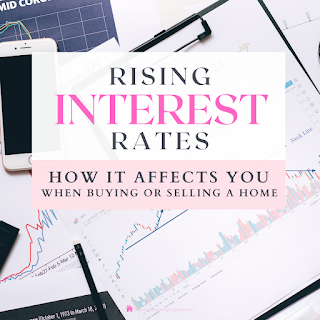Rising Interest Rates and How it Affects You
Skyrocketing Mortgage Rates
If you are in the market to buy or sell a home, you have noticed the recent skyrocketing interest rates. Well, compared to what they have been during the pandemic anyway.
Mortgage Rate History
Interest rates for a 30-year fixed rate mortgage have been steadily decreasing since 2011. During Covid pandemic, interest rates dropped to historical lows. According to Rocket Mortgage, “December 2020 saw mortgage rates hit 2.68%, according to Freddie Mac.”
The highest interest rates in our history were in October of 1981. Interest rates then were at 16.63%, due to record high inflation according to Rocket Mortgage.
And, compared to the average credit card interest rate of 20.17%, our current 5.75% interest rate for a 30-year fixed rate mortgage doesn't seem so bad, does it?
CURRENT RATES
The average interest rate for a 30-year mortgage currently sits at about 5.75%. When just one week ago, June 20th, 2022, the interest rates were at 6.28%.
At the beginning of 2022 the average interest rate was 3.45% and one year ago, June of 2021, the average interest rate was 3.1%.
But, let me tell you it's not as bad as it may seem, and interest rates could be worse. Take a look at the graph to see how the rates have fluctuated over the last 50 years.
HOW THIS AFFECTS YOU
Let’s put these numbers into perspective…
According to Fortune, If a homebuyer took out a $400,000 mortgage today at a 6.28% interest rate, that principal and interest payment comes out to about $2,471 per month.
If the same person took out a $400,000 mortgage in June 2021 at 3.1% interest rate (then average) they’d be paying about $1,708 per month.
AS A BUYER
This rapid increase in interest rates have caused many homebuyers to retract from buying a home. The buyers who are left are having to make tough trade-offs to make their purchase affordable.
AS A SELLER
Sellers will have to adjust their expectations. More and more homes are expected to come on the market creating less demand. It will be important for sellers to price their home realistically to the changing market to get it sold.
*Disclaimer: Rates in article may differ from current rates. Consult a licensed mortgage broker for a personalized quote.
RENT IN OREGON
Now let's compare renting to purchasing…
According to rent.com the average renter pays $2,000 per month for a one-bedroom and $2,054 for a two-bedroom. That seems low for our area, so I searched craigslist.
Here is what I found in Southern Oregon:
A 3-bedroom, 2-bathroom home in East Medford rents for $2,850.
A 3-bedroom, 2-bathroom home in Ashland rents for $2,300 per month.
A 3-bedroom, 2-bathroom condo in East Medford rents for $2,500 per month.
MY TWO CENTS
Historically homes increase in value over time, building equity. Equity in a home is the difference between what you owe (loan) and the current market value of your home (what you could sell it for). The difference between the two is your profit.
Owning a home is the soundest investment one could make compared to the stock market or gambling.
According to Forbes.com, “Homeowners have a net worth that is more than 40 times greater than their renter counterparts, which reinforces the idea that owning a home is a smart financial move. Homeowners had a median net worth of $255,000 in 2019; renters had a median net worth of just $6,300.”
At the end of the day every person needs a place to live. It’s going to cost you money either way; whether you rent or buy. So, would you rather build your personal wealth or someone else's?








Comments
Post a Comment
Join the conversation by leaving a comment!